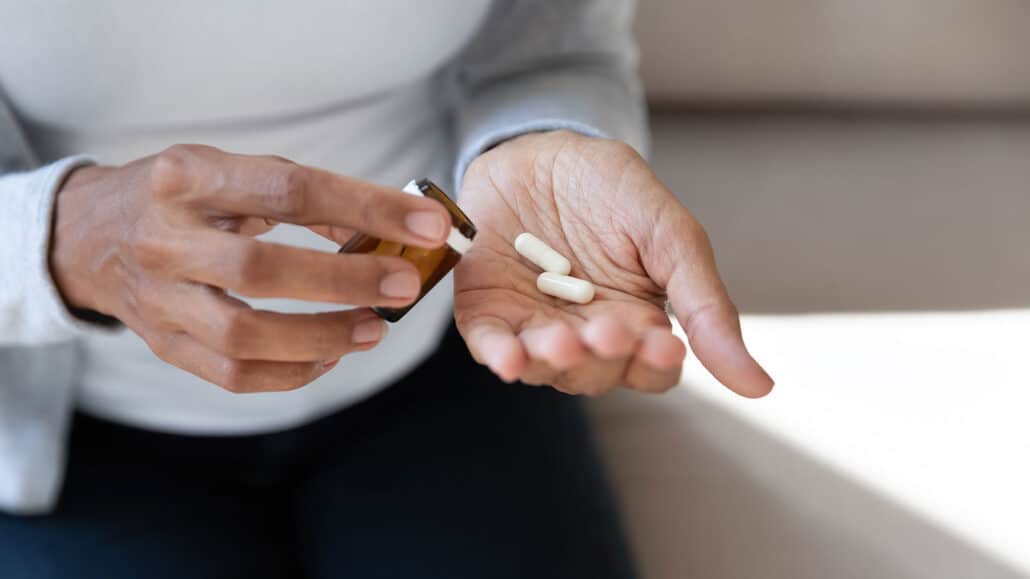Cymbalta is a prescription medication that’s FDA-approved to treat depression, anxiety, neuropathy, fibromyalgia, and other musculoskeletal pain. Its effects on the brain create the potential for misuse, which can lead to addiction. In 2021, Cymbalta was the 27th most prescribed drug in the United States, and today, its abuse affects thousands of New Yorkers. To reverse a dependency on Cymbalta, it’s critical to address the issue quickly to ensure the best outcome. Fortunately, recovery from Cymbalta is possible with proper medical intervention.

Table of Contents
- 1 Understanding Cymbalta and Its Uses
- 2 Cymbalta Addiction: Recognizing the Signs
- 3 Factors Contributing to Cymbalta Addiction
- 4 Other Side Effects of Cymbalta Addiction
- 5 Treatment Options for Cymbalta Addiction in New York
- 6 Finding Help in New York: Resources and Support
- 7 The Road to Recovery: What to Expect
- 8 Find Compassionate, Professional Treatment for Cymbalta Addiction in New York
Understanding Cymbalta and Its Uses
Cymbalta (duloxetine hydrochloride) is a serotonin-norepinephrine reuptake inhibitor (SNRI) antidepressant medicine that is taken orally as a capsule or pill. It works by increasing the available amounts of serotonin and norepinephrine in the brain by inhibiting the reuptake of these neurotransmitters.
Cymbalta works by helping to restore the brain’s neurochemical balance. It has been approved by the U.S. Food and Drug Administration as a treatment for generalized anxiety disorder (GAD), major depressive disorder (MDD), diabetic peripheral neuropathy, fibromyalgia, and chronic musculoskeletal pain. Doctors have also been known to prescribe it off-label to treat stress urinary incontinence.
Increasing levels of serotonin and norepinephrine in the brain are believed to help regulate mood and diminish sensitivity to pain. People who take Cymbalta may feel mentally calmer and physically more energetic. They may also experience a positive shift in mood, improved appetite, and better sleep.
Cymbalta Addiction: Recognizing the Signs
Substance use disorders, including addictions to prescription antidepressants like Cymbalta, can vary in type and severity. Addiction to a substance is characterized by its compulsive misuse despite negative consequences, while dependence refers to a state of physical reliance. Environment and genetics are factors that can increase the chance of developing an addiction.
Signs and symptoms of Cymbalta addiction often include:
- periods of unusually high energy
- unpredictable behavior
- frequent requests for refills or increases in dosage
- lack of caution about side effects
- impaired functioning at work, home, or school
- mood swings
- bloodshot eyes
- significant weight loss
- taking a higher-than-prescribed dose
- using Cymbalta while driving or operating heavy machinery
Although Cymbalta is not classified as an addictive substance, its abuse and subsequent dependency have psychological and physical aspects. People who use Cymbalta regularly and then try to take less or stop taking it completely are likely to experience debilitating withdrawal symptoms, which can lead to and perpetuate a cycle of addiction. As users build up a tolerance to Cymbalta, they may take higher doses of the medication to counteract the effects of withdrawal.

Factors Contributing to Cymbalta Addiction
There are a number of reasons why a person might develop an addiction to Cymbalta. Many experts believe that people with a genetic predisposition to addiction or a history of misusing drugs are more likely to abuse the drug. Most people who do so enjoy its stimulating, pain-relieving, and mood-lifting effects.
Unfortunately, misusing Cymbalta can be risky, especially when it is taken over long periods of time or in higher doses. Abusing the drug is associated with several negative and sometimes dangerous side effects that can make it difficult to function normally.
Anyone who experiences the following side effects while taking Cymbalta should seek immediate medical attention:
- seizures
- vision changes or eye pain
- bloody or black stools
- vomiting
- liver failure
- rapid drops in blood pressure
- dizziness or fainting
- frequent nosebleeds, bleeding gums, or other uncontrolled bleeding
- suicidal ideation
Studies show that negative side effects may continue and worsen when Cymbalta is used long-term. The risk of liver failure can increase with alcohol use.
Other Side Effects of Cymbalta Addiction
Cymbalta addiction is often associated with other serious and dangerous side effects, especially when the drug has been used for a long time.
Serotonin Syndrome
Although Cymbalta is sometimes prescribed at high doses or for long-term use, its neurological effects can vary and carry serious health risks. Taking Cymbalta in large doses can sometimes cause serotonin syndrome, a condition that involves building up abnormally high levels of serotonin in the body that can cause dangerous cardiovascular changes. People who experience serotonin syndrome may suffer from fluctuations in their heart rate and blood pressure, muscle spasms, and seizures.
Cymbalta users who concurrently take other serotonergic medications have a higher risk of developing serotonin syndrome. When toxic levels of serotonin are activated, the condition can be deadly.

Other Long-Term Effects of Cymbalta Use
Cymbalta affects people differently according to their brain chemistry, body weight, and other factors.
The drug is typically not recommended for people who have pre-existing cardiovascular conditions. Although the long-term effects of antidepressants have not been widely studied, the FDA advises users against taking the medication if health-threatening symptoms emerge.
Taking Cymbalta long-term may cause or lead to:
- addiction
- physical dependence
- mania, hypomania, or severe depression
- jaundice and liver failure
- gastrointestinal issues
- renal impairment
- urinary retention
- extreme weight gain
- cardiovascular issues
- poor concentration
- irritability
- tiredness
- loss of sexual drive
Overdose
Since misuse of Cymbalta can have toxic and potentially life-threatening effects on brain chemistry, it should only be used as prescribed by a qualified physician. Overdosing on Cymbalta can be especially dangerous if it is taken with alcohol or other central nervous system depressants.
Symptoms of an overdose include:
- vomiting
- rapid changes in blood pressure
- extreme fatigue
- fainting
- seizures
- coma
Long-term Effects of Cymbalta Withdrawal
For some people, Cymbalta may be contraindicated for both short-term and long-term use. People who become addicted to the way Cymbalta makes them feel may experience potentially life-threatening withdrawal symptoms if they try to stop using the drug abruptly and without proper medical supervision.
Quitting Cymbalta either suddenly or gradually without a medical strategy can place you at risk for discontinuation syndrome, a set of symptoms that are associated with withdrawal. Users must follow a proper guided tapering schedule, as both the short-term and long-term effects of discontinuing Cymbalta can be serious. People who try to stop taking Cymbalta without professional help may experience the reappearance and worsening of their prior condition or adverse side effects, including headaches, insomnia, confusion, panic attacks, and suicidal ideation. These symptoms may last for weeks or persist long after Cymbalta use has completely stopped and the drug has left the body. The central nervous system must adapt to and correct its neurotransmitter imbalances and dysfunction in order for the symptoms to subside.

Treatment Options for Cymbalta Addiction in New York
If you are misusing Cymbalta, you may benefit from addiction treatment in New York. Depending on your level of dependency, you may need detox services, which are a much safer way to get the drug out of your system than fighting your dependency on your own.
During a medical detox program, medical professionals can properly taper your dose and treat any adverse side effects. They create a safe situation that allows the drug to leave the body while a doctor supervises the patient and manages any withdrawal symptoms. These programs can take place in a hospital, inpatient, or outpatient setting, depending on the severity of the problem and the level of risk to the patient.
Hospitalization
Patients who are using multiple substances in addition to Cymbalta or who have a high seizure risk may need to enroll in a hospital-based medical detox program that provides 24-hour care.
Inpatient Care
Inpatient detox programs for Cymbalta addiction provide a safe place for evaluating and treating your substance use disorder. These programs are provided in live-in treatment centers that provide 24-hour, seven-day-a-week medical supervision and access to doctors and counselors who can help you taper your dosage. They are the best option for otherwise healthy people who might have difficulty managing their addiction at home. Inpatient detoxification includes careful management of withdrawal symptoms and monitoring of any complications that may result from quitting Cymbalta.
Outpatient Services
Outpatient treatment facilities offer clinical and medical services for people who are addicted to Cymbalta. Treatment may be provided at different levels according to the patient’s needs and the severity of their addiction. Patients generally work with a professional team of addiction specialists in a series of scheduled appointments while tapering at home.
Since quitting Cymbalta abruptly can be dangerous, it’s important to consult your doctor or psychiatrist before you stop taking Cymbalta. A doctor will help you gradually lower your dose of Cymbalta to decrease the severity of your withdrawal. Current guidelines advise doctors to taper antidepressant medications for a minimum of four weeks, based on:
- how long you have been taking the drug
- the amount of your most recent dose
- your medical history
When tapering off of Cymbalta seems too difficult, your doctor may have you taper at a slower rate so that your side effects will be more manageable.
Helpful Therapeutic Modalities
After detoxification, it’s important to seek continued medical and psychological support as you recover from your addiction to Cymbalta. There are many treatment options available, which may include individual therapy, group therapy, and cognitive-behavioral therapy.
Whether you choose an inpatient or outpatient addiction treatment program, it’s helpful to work with counselors and peers who can help you stay abstinent and healthy. Individual therapy can provide you with private guidance, while group therapy can give patients a sense of mutual, non-judgmental support. Many patients also enroll in cognitive-behavioral therapy (CBT) programs that help them identify and change unhelpful thought patterns and behaviors that can contribute to relapse. Your doctor can help you choose a treatment program that works for you.

Finding Help in New York: Resources and Support
New York has hundreds of privately owned and operated state-certified and monitored treatment facilities across the state. Its Office of Addiction Services and Supports (OASAS) also operates twelve addiction treatment centers (ATCs) that provide responsive, personalized care and facilitate long-term recovery. Medical professionals at your chosen facility are trained to help you manage co-occurring conditions, such as mental health disorders.
As you’re considering your treatment options for Cymbalta addiction, you should consider the following factors:
First Impressions
It’s important that you feel comfortable and safe at the treatment facility you choose. You should be able to trust the staff to provide effective care.
Accreditation and Licensing
The treatment program, clinicians, and/or facility you choose to work with should be licensed and accredited by the state of New York and receive commendation and official recognition from governing organizations in the drug treatment center industry.
Treatment Modalities
It’s important to know that the treatments and level of care offered at your facility of choice will meet your needs. You want to undergo treatment that will help you heal as you overcome your addiction. You should research the various levels of care and phases of treatment and discuss your options with a medical professional who can guide you towards choosing the most beneficial option.

The Road to Recovery: What to Expect
Recovering from an addiction to Cymbalta can be challenging, but it’s achievable with proper support. The duration and intensity of the recovery process can vary from person to person.
How Long Does Cymbalta Withdrawal Last?
Cymbalta withdrawal symptoms can take anywhere from a few days to several weeks to subside, depending on your physiology, the length of time you’ve been taking Cymbalta, your dosage, and whether you are also facing other co-occurring mental health or substance abuse issues. If you have taken Cymbalta for more than six months, your withdrawal may be longer and more difficult.
Phases of Cymbalta Withdrawal
Cymbalta withdrawal usually has several stages, and the timeline for the process can vary.
Most people undergoing withdrawal from Cymbalta experience the worst symptoms within 2 weeks after they stop taking the drug. After that, the symptoms are usually milder, but they can go on for weeks or even months.
The phases of withdrawal are likely to unfold as follows:
Initial Withdrawal (Days 1-3):
In the first stage of Cymbalta withdrawal, users may experience gastrointestinal distress, dizziness, headaches, and insomnia. While the length and severity of this phase can vary, symptoms usually manifest 1–3 days after you quit taking Cymbalta.
Acute Withdrawal (Weeks 1-2):
Acute withdrawal generally lasts for one to two weeks after you stop taking Cymbalta. Symptoms may include mood swings, agitation, and sensory disturbances.
Subacute Withdrawal (Weeks 2-4):
During subacute withdrawal, intense symptoms persist but gradually subside. It’s common to experience tiredness, difficulty concentrating, and mood swings during this period, which typically lasts from the second to the fourth week after you stop taking Cymbalta.
Post-Acute Withdrawal (6 Months or Longer):
Post-acute withdrawal is characterized by residual symptoms like anxiety, low mood, and cravings for Cymbalta that may last six months or longer. Symptoms can also include irritability, confusion, brain fog, and insomnia.
Support Strategies to Prevent Relapse
Recovering from an addiction to Cymbalta can be a long and difficult process, so it’s important to take care of yourself and seek support during this time. It will help you to develop a support system of professionals, friends, and family who are willing to share your journey and provide understanding and practical help. Think about joining an in-person or online support group that is focused on Cymbalta recovery. Connecting with peers who have experienced challenges like your own can help you feel less alone.

Find Compassionate, Professional Treatment for Cymbalta Addiction in New York
Addiction to Cymbalta, or any prescription antidepressant, can be difficult to treat, but recovery is possible with the right care. There are a variety of effective treatment options available in New York, and one is sure to suit your needs. If you’re ready to take steps to reclaim your sobriety and live a healthy life, Long Island Interventions is here to help. Our caring experts are here to help you free yourself from drug dependency and step forward into a better future.
Please contact Long Island Interventions for information about Cymbalta Addiction Treatment near you.

